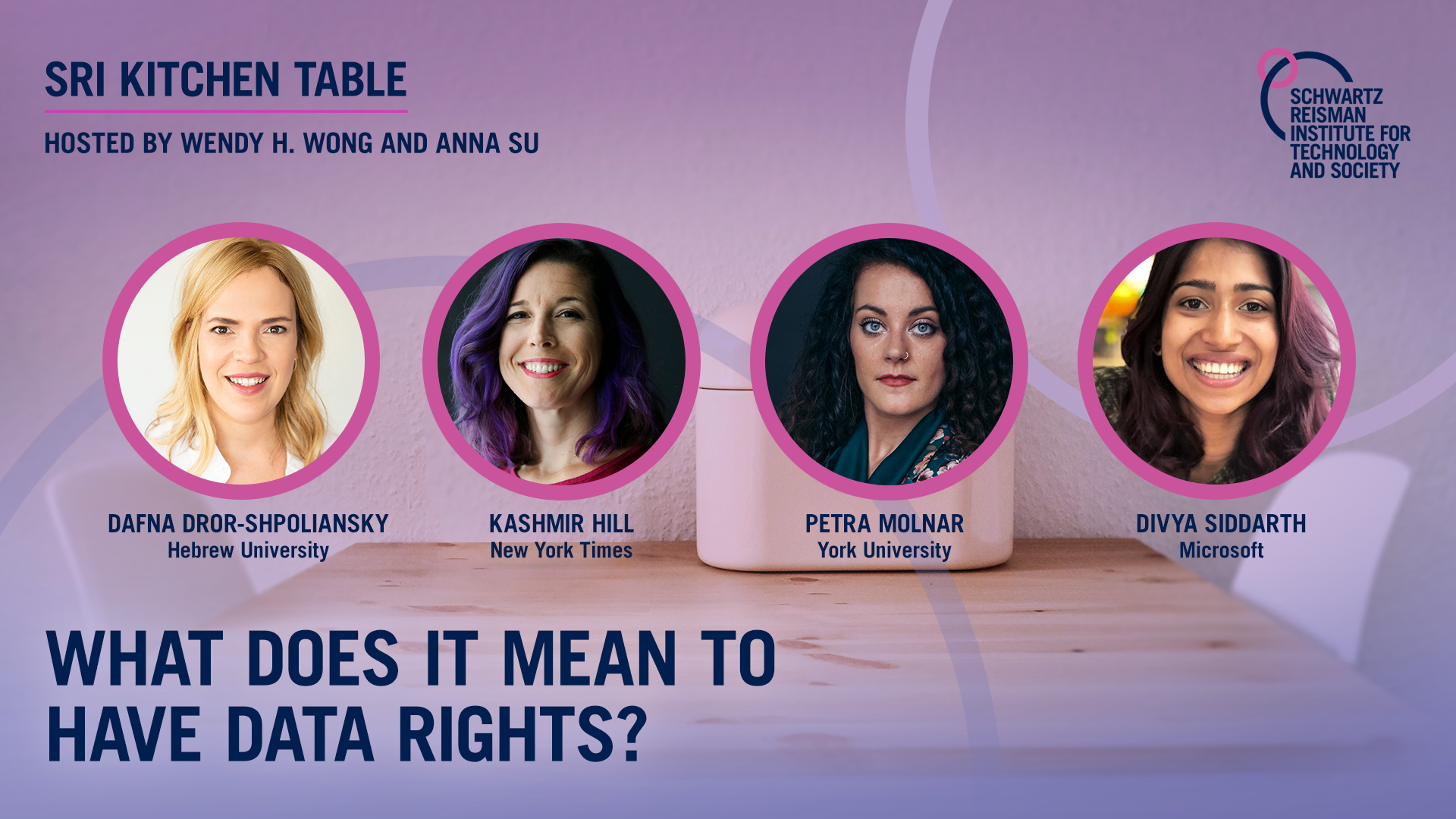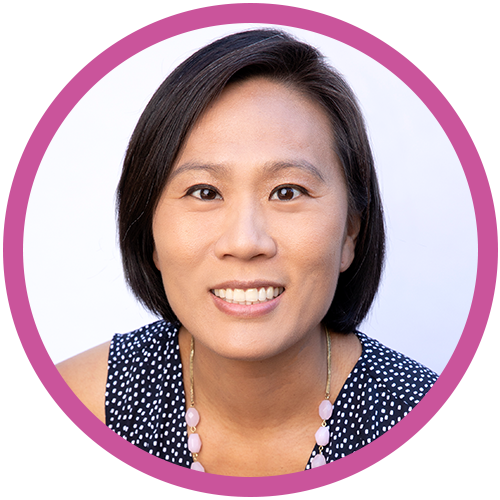Kitchen tables are typically places where people gather informally to exchange food. In our case, SRI Kitchen Tables will exchange food for thought. We seek to bring together key thought leaders to advance conversations around pressing issues in thought-provoking ways. We want to keep these Tables informal and collaborative so we can get to the heart of how human rights matter in our data-intensive and algorithmically-informed world, and what challenges lay ahead of us. After all, the human rights concerns raised by emerging technologies affect us all.
In this first session, SRI Research Lead Wendy H. Wong and Faculty Fellow Anna Su will explore the possibilities of data about people, and the challenges of asserting our rights over data about us that go beyond privacy. Questions asked will include:
Is it possible to “own” data in a meaningful way?
To what extent can we claim rights to our data, even if we don’t own it?
WITH Featured Guests:
Dafna Dror-Shpoliansky, PhD candidate at the Hebrew University.
Kashmir Hill, tech reporter at The New York Times.
Petra Molnar, associate director of the Refugee Law Lab, York University.
Divya Siddarth, associate political economist and social technologist at Microsoft.
About the participants
Dafna Dror-Shpoliansky is a PhD candidate at the Hebrew University, and a visiting doctoral student at University of Toronto Faculty of Law. Her research focuses on the future of human rights law in the digital age. Dror-Shpoliansky was a research assistant for the “Human Rights in the Digital Era” project led by Wendy Wong at SRI. Her recent publication, "It’s the End of the (Offline) World as We Know It: From Human Rights to Digital Human Rights – A Proposed Typology", co-authored together with Yuval Shany, was recently published at the European Journal for International Law. Prior to pursuing her PhD, Dror-Shpoliansky was a legal counsel at the Office of the Deputy Attorney General of Israel (International Law Department). Her practice there focused on advising on international human rights law aspects regarding legislative procedures and Supreme Court proceedings, as well as reporting to the UN Human Rights Treaty Bodies.
Kashmir Hill is a tech reporter based in New York. She writes about the unexpected and sometimes ominous ways technology is changing our lives, particularly when it comes to our privacy. She joined The New York Times in 2019, after having worked as an investigative reporter at Gizmodo Media Group and as a writer and editor at Fusion, Forbes Magazine, and Above the Law. Her writing has appeared in The New Yorker and The Washington Post. In 2018, she gave a TED talk—"What your smart devices know (and share) about you"—in which she described what happened when she transformed her apartment into a smart home and monitored the data being sent out of it. She has degrees from Duke University and New York University, where she studied journalism.
Petra Molnar is a lawyer and anthropologist working on the human rights impacts of border technologies on people crossing borders. She is the associate director of the Refugee Law Lab at York University and Osgoode Hall Law School, and is currently working on her book, Artificial Borders: AI, Surveillance, and Border Tech Experiments, to be published in fall of 2022.
Divya Siddarth is a political economist and social technologist, and her current research focus is around promoting and preserving the digital commons, building the technology and policy infrastructure for data cooperatives, and devising frameworks for collectively-focused, rather than centrally concentrated, AI. She works with Microsoft, the RadicalXChange Foundation, and the Ostrom Workshop, and has been at Stanford's Digital Civil Society Lab and Microsoft Research.
Anna Su is an associate professor in the Faculty of Law at the University of Toronto, and a 2021-23 Schwartz Reisman faculty fellow. Su’s primary areas of research include the law and history of international human rights law, U.S. constitutional law (First Amendment), and law and religion. Su holds an SJD from Harvard Law School where her dissertation was awarded the John Laylin Prize for best paper in international law. She received her JD and AB degrees from the Ateneo de Manila University in the Philippines. Prior to coming to Toronto, she held a postdoctoral fellowship at the Baldy Center for Law and Social Policy based in SUNY Buffalo Law School, and a graduate fellowship in ethics with the Edmond J. Safra Center for Ethics at Harvard University. She worked as a law clerk for the Philippine Supreme Court and was a consultant to the Philippine government negotiating panel with the Moro Islamic Liberation Front.
Wendy H. Wong is a professor of political science, Canada Research Chair in Global Governance and Civil Society, and a research lead at the Schwartz Reisman Institute for Technology and Society at the University of Toronto. She served as the Director of the Trudeau Center for Peace, Conflict, and Justice at the Munk School of Global Affairs and Public Policy from 2012-2017. She earned her PhD from the University of California, San Diego. Wong has published in a variety of academic venues, primarily about the contours of international human rights, the political effects of nongovernmental organizations (NGOs), and how variations in organizational structure change the effectiveness of non-state actors in global affairs. Both of her previous books were recognized with the top prize from the Association for Research on Nonprofit Organizations and Voluntary Action. Wong is currently working on a book that explores how datafication affects human rights, and why we need to reboot human rights now more than ever as our lives become increasingly defined by data.
About SRI Kitchen Tables
Kitchen tables are typically places where people gather informally to exchange food. In our case, SRI Kitchen Tables will exchange food for thought. We seek to bring together key thought leaders to advance conversations around pressing issues in thought-provoking ways. We want to keep these Tables informal and collaborative so we can get to the heart of how human rights matter in our data-intensive and algorithmically-informed world, and what challenges lay ahead of us. After all, the human rights concerns raised by emerging technologies affect us all.
SRI Kitchen Tables run for 90 minutes, and will consist of participant remarks, followed by a moderated discussion with the Kitchen Table organizers, and then an audience Q&A.








